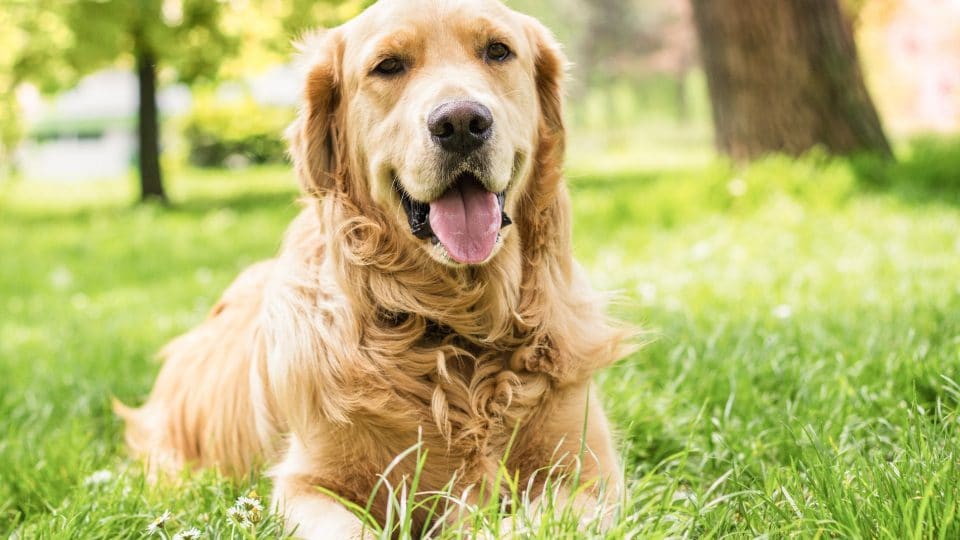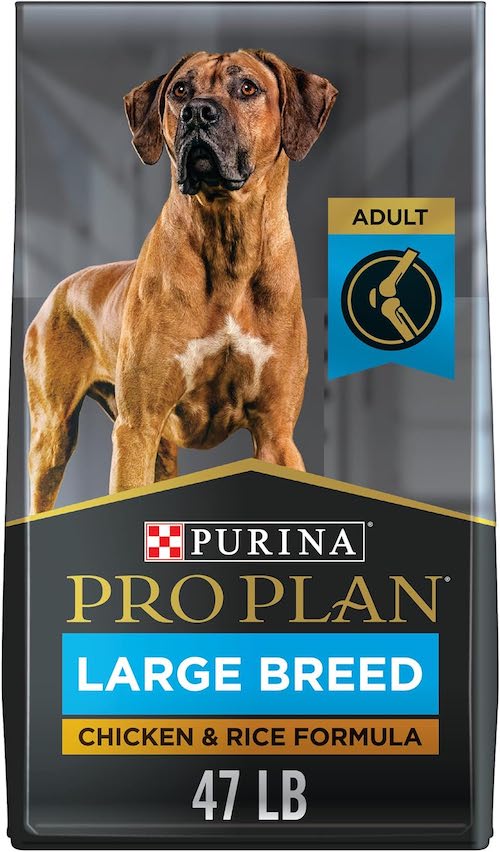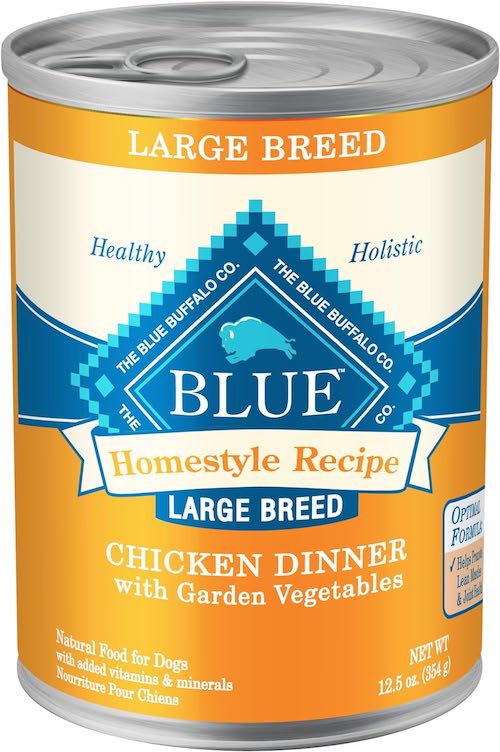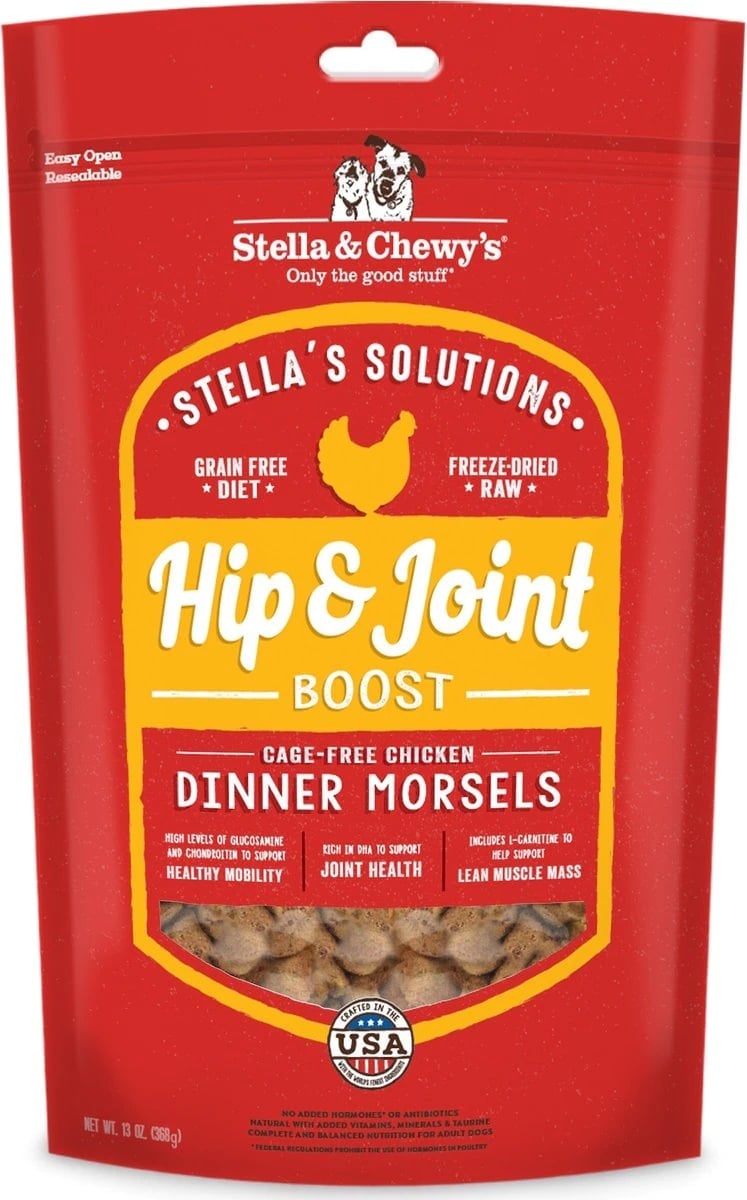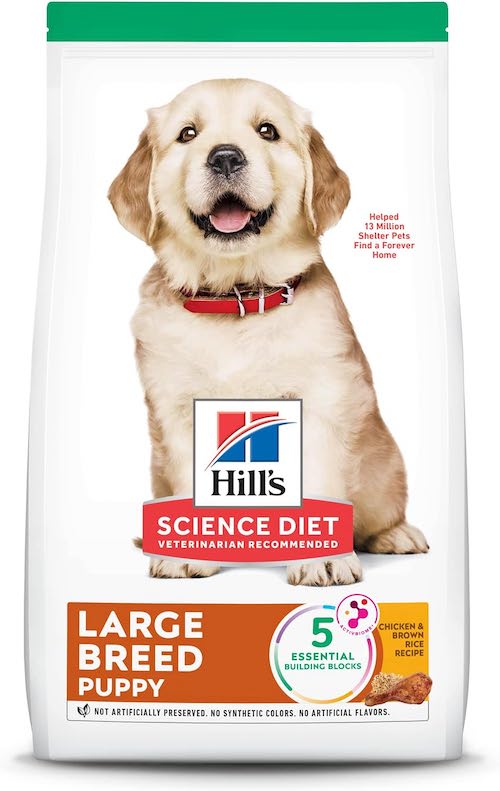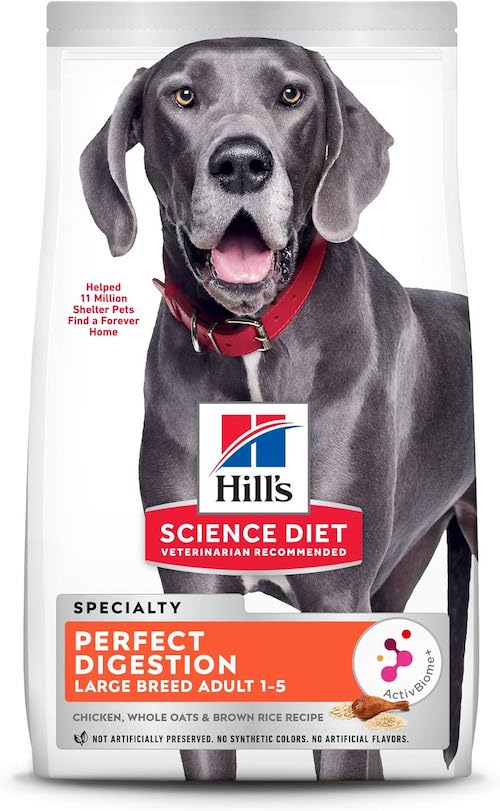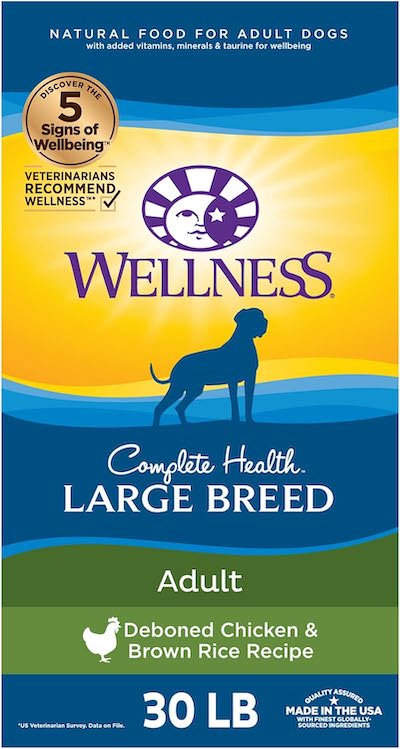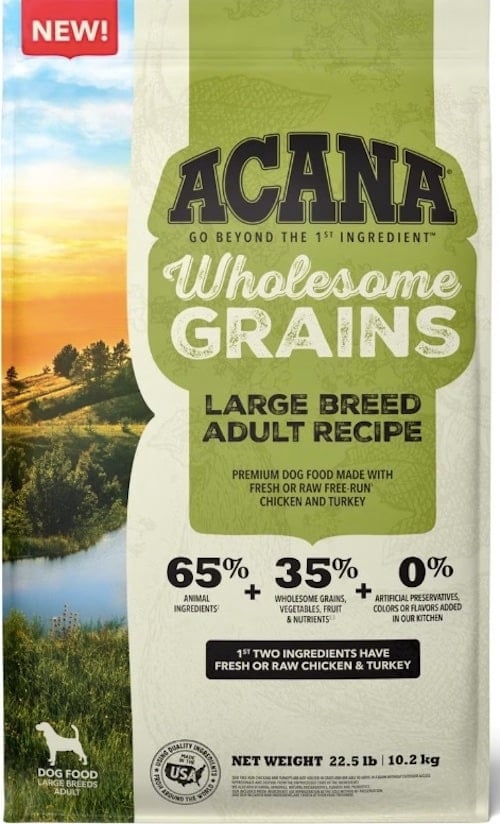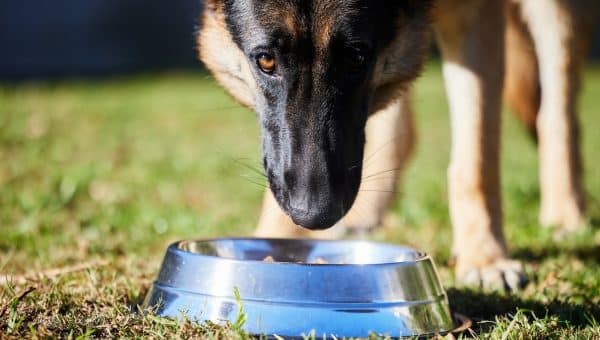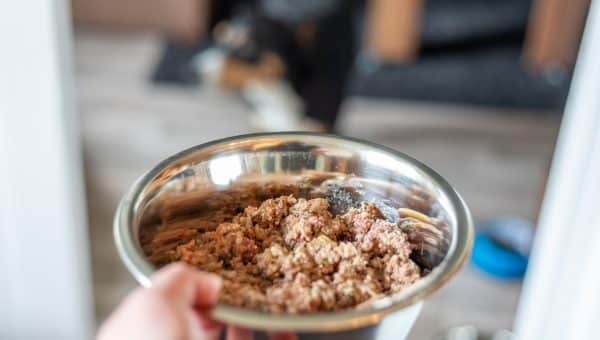- This post contains affiliate links. Read more here.
- Not a substitute for professional veterinary help.
The nutritional needs of most healthy dogs are generally pretty similar—even between breeds as different as a Chihuahua and a Great Dane. That said, there’s good reason to consider a large-breed-specific formula for pups over 50 pounds.
First, large dogs have slower metabolisms than small dogs, so they need fewer calories per pound of body weight. Bigger bodies also put added stress on hard-working muscles and joints, so large breeds benefit from additional nutrients like glucosamine and chondroitin sulfate. Bloat is a risk that large breeds run more often than little ones, which is why bigger pieces of food that encourage slower eating are a smart choice. Plus, large-breed puppies can experience musculoskeletal problems if they grow too fast, so they require limited calcium levels to keep growth at a slow and steady pace.
With these criteria in mind, we’ve chosen 11 AAFCO-compliant foods that will work well for a range of large-breed dogs. However, it’s important to remember that every dog will have unique needs and preferences. It’s always wise to consult your veterinarian for advice before changing your pup’s diet.
Best Dry Food: Purina Pro Plan Large-Breed Chicken & Rice Formula
Many pet parents prefer to feed their dogs dry food because it’s affordable, widely available, and convenient to store and serve. This recipe from Purina’s Pro Plan line is formulated for adult dogs weighing 50 pounds or more. Chicken meal and fish meal provide natural sources of glucosamine, which promotes mobility by strengthening muscles and joints. Plenty of omega-3 fatty acids also help keep your dog moving.
With over 29% protein on a dry matter basis, this formula is well-suited to active bigger breeds, like German Shepherds and Weimaraners. Prebiotic fiber promotes healthy intestinal bacteria for better gut health and digestion. Additionally, the kibble size is appropriate for larger jaws, measuring ½” in diameter. This slows down voracious eaters, aiding in digestion and preventing bloat.
Key Nutrients:
- 407 kcal/cup
- Protein: 29.55%
- Fat: 13.64%
- Crude Fiber: 5.11%
- Calcium: 1.1%
Find on Chewy Find on Amazon Find on Petco Find on PetSmart Find on Walmart
Best Wet Food: Blue Buffalo Homestyle Recipe Large Breed Chicken Dinner
Some pet parents find wet canned food to be a better fit for their dog, as it contains higher levels of moisture and protein and is usually lower in carbohydrates. This pâté-style wet food is made with easily digestible ingredients like chicken, brown rice, and sweet potatoes. It also includes glucosamine and chondroitin, which help maintain strong joints. Fish oil offers omega fatty acids that promote healthy skin, coats, and joints.
This Blue Buffalo recipe offers complete and balanced nutrition that can be served as a meal on its own or offered as a meal topper on dry food for added flavor and nutrition.
Key Nutrients:
- 493 kcal/cup
- Protein: 45.45%
- Fat: 34.09%
- Crude Fiber: 6.82%
Find on Chewy Find on Amazon Find on Petco
Best Fresh Food: JustFoodForDogs Joint & Skin Support
Made with gently cooked proteins, veggies, and grains, fresh food is highly palatable to most dogs. Plus, many pet parents swear by its health benefits.
Each recipe from fresh food brand JustFoodForDogs is comprised of 100% human-grade ingredients and meets AAFCO guidelines. This particular formula is designed to promote joint and skin health. It contains Type II Collagen for joint support and Icelandic-sourced fish oil for Omega-3s, which reduce joint inflammation and improve skin condition. With pork as its single animal protein source, this limited-ingredient, low-fat recipe is also ideal for large dogs with sensitive stomachs.
Key Nutrients:
- 1143 kcal ME/kg; 32 kcal ME/oz
- Protein: 40.91%
- Fat: 11.36%
- Crude Fiber: 9.09%
Find on JustFoodForDogs Find on Chewy Find on Petco
Best Raw: Stella & Chewy’s Solutions Hip & Joint Boost Freeze-Dried Raw Dinner Morsels
Raw food may not be suitable for every dog, especially puppies or those with a compromised immune system. However, some pet parents who prefer raw food report better digestion, improved skin and coat health, and increased energy levels.
Freeze-dried raw food is made through a multi-step process of freezing and drying that is believed to retain more nutrients than dehydration. It’s a convenient way to incorporate raw food into your dog’s diet, as it doesn’t require refrigeration and can remain shelf-stable for up to three years.
Like all Stella & Chewy recipes, these freeze-dried raw morsels undergo high-pressure processing to eliminate harmful bacteria. It’s also tested by a third party for Salmonella, E.coli, and Listeria.
With guaranteed levels of glucosamine, chondroitin, and omega-3 fatty acids, this food keeps joints in top-performing shape. You’ll also find natural anti-inflammatories that can reduce joint pain, such as New Zealand Green Mussels, Tumeric, and Lavender. In addition, this food includes L-carnitine, an amino acid for heart health.
These freeze-dried bits can be used as a topper or offered as a complete meal. They’re on the larger size, so big dogs will have to chew them instead of gulping them down.
Key Nutrients:
- 184 kcal/cup
- Protein: 42.11%
- Fat: 24.21%
- Crude Fiber: 5.26%
Find on Chewy Find on Amazon Find on Petco
Best for Puppies: Hill’s Science Diet Large Breed Puppy Food
Puppies grow quickly, but it’s essential that large-breed puppies don’t grow too fast. Rapid growth can cause developmental abnormalities in bigger pups, so they need a diet with carefully controlled calcium levels. This recipe from Hill’s provides 0.89% calcium on a dry-matter basis, placing it well under the safe threshold for large-breed puppies.
This recipe includes prebiotics to nourish your pup’s gut microbiome. Plus, fiber-rich ingredients like brown rice and beet pulp help keep their GI tract working smoothly. The addition of fish oil supports your puppy’s brain and eye development. The kibble size is roughly 5.5mm x 13.5mm.
Key Nutrients:
- 391 kcal/cup
- Protein: 24%
- Fat: 11%
- Crude Fiber: 3%
- Calcium: .89%
Find on Chewy Find on Amazon Find on Petco Find on PetSmart
Best for Seniors: IAMS Proactive Health Healthy Aging Large Breed
Large and giant breeds are typically considered seniors when they reach 6-8 years of age. As they enter their senior years, it’s important that large dogs are fed diets that promote mobility and keep them active. Older dogs, especially bigger breeds, are more susceptible to weight gain, loss of muscle mass, and weakened immune systems.
This Iams recipe is designed to address these concerns by providing high protein to maintain strong muscles and glucosamine and chondroitin to support strong joints. It has a moderate caloric density to prevent excessive weight gain as your dog ages. Additionally, natural fibers from ingredients like beet pulp encourage a healthy GI tract and regular bowel movements.
DHA keeps your dog’s cognition bright, and an antioxidant blend encourages a robust immune system.
Key Nutrients:
- 347 kcal/cup
- Protein: 28.89%
- Fat: 12.22%
- Crude Fiber: 6.11%
- Calcium: 1.28%
Find on Chewy Find on Amazon Find on Petco Find on PetSmart
Best for Weight Loss: Eukanuba Fit Body Weight Control Large Breed Dry Food
Helping your dog lose weight is a multi-faceted process. Along with regular exercise and plenty of hydration, a healthy diet plays a crucial role. This Eukanuba recipe is formulated to help adult dogs weighing over 55 pounds to maintain an ideal weight.
It’s formulated with lower fat content (10% dry matter) and fewer calories to keep dogs from gaining too much weight. It also has generous amounts of protein (28.89% dry matter) to maintain strong muscles during your dog’s weight loss journey.
Additionally, it contains chondroitin and glucosamine to support joints and help your dog maintain their exercise regimen. Finally, Eukanuba’s 3D DentaDefense promotes dental health by reducing tartar buildup.
Key Nutrients:
- 267 kcal/cup
- Protein: 28.89%
- Fat: 10%
- Crude Fiber: 4.44%
Find on Chewy Find on Amazon Find on Petco Find on PetSmart
Best for Digestion: Hill’s Science Diet Perfect Digestion Large Breed Dry Food
It’s not uncommon for large dogs to have sensitive stomachs, which often manifest as diarrhea. This Hill’s formula includes the brand’s exclusive “ActivBiome+ Technology,” a blend of prebiotics that promotes digestive health. Ingredients like whole grain oats, pumpkin, beet pulp, and brown rice also encourage regular, solid stools. The kibble size is larger to prevent big dogs from wolfing down meals and causing indigestion. Plus, fish oil and flaxseed provide omega fatty acids for joint health.
Key Nutrients:
- 380 kcal/cup
- Protein: 22.22%
- Fat: 12.22%
- Crude Fiber: 4.44%
Find on Chewy Find on Amazon Find on Petco Find on Walmart
Best for Food Allergies: Natural Balance L.I.D. Large Breed Lamb & Brown Rice Formula
Most canine food allergies are related to the proteins in their diet, like chicken and beef. If your dog is allergic to certain ingredients, Natural Balance offers a decent selection of novel proteins that can help your dog avoid a reaction.
This grain-inclusive formula features lamb as its only animal protein source. Among its limited ingredients is fiber-rich brown rice, which aids in digestion.
Although not specifically designed for large breeds, the brand also carries a grain-inclusive duck formula that sits within AAFCO guidelines for bigger dogs. If your dog is sensitive to duck, lamb, or grains, Natural Balance offers grain-free formulas with Venison, Bison, and Salmon. Each recipe contains a pared-down list of digestible ingredients that are easy on sensitive tums.
Key Nutrients:
- 370 kcal/cup
- Protein: 24.44%
- Fat: 13.33%
- Crude Fiber: 4.44%
- Calcium: 1.3%
Find on Chewy Find on Amazon Find on Petco Find on PetSmart Find on Walmart
Best for Skin & Coat Health: Wellness Complete Health Large Breed
If your dog has dry skin, a brittle coat, or suffers from seasonal allergies that cause excessive itching, this large-breed formula from Wellness Complete may be able to help. Many pet parents have reported noticeable improvement in their dog’s appearance and softness after switching to this formula.
This food contains Zinc, Biotin, and omega fatty acids, which are essential nutrients for supporting a shiny coat and healthier skin. For better overall health, this recipe also includes glucosamine, antioxidants, probiotics, and taurine.
Key Nutrients:
- 340 kcal/cup
- Protein: 28.89%
- Fat: 13.33%
- Crude Fiber: 5.56%
- Calcium: 1.3%
Find on Chewy Find on Amazon Find on Petco Find on PetSmart Find on Walmart
Best High Protein: Acana Wholesome Grains Large Breed Dry Food
Not all dogs need a high-protein diet, but highly active or working dogs may benefit from one. While there’s no official definition for high protein food, generally, recipes containing at least 30% on a dry matter basis fall into this category.
Formulated specifically for large breeds, this Acana formula contains 30.88% protein sourced from lean chicken and turkey. It also includes glucosamine & chondroitin to keep active dogs running, jumping, and playing.
You’ll also find plenty of fiber from healthy grains, pumpkin, butternut squash, and probiotics. And fatty acids for strong joints are provided by herring meal, fish oil, and ground flaxseed.
Key Nutrients:
- 398 kcal/cup
- Protein: 30.68%
- Fat: 14.77%
- Crude Fiber: 6.82%
- Calcium: 1.48%
How We Chose
The products featured here were selected based on a combination of our own hands-on testing, a comprehensive look at customer reviews across a wide variety of retail platforms, and interviews with veterinary experts. We selected recipes formulated according to AAFCO standards, prioritizing foods with digestible ingredients, omega fatty acids for joint support, and larger kibble sizes. In addition, we focused on foods with controlled calcium levels and moderate calorie levels. We’re also guided by the experience of living and playing alongside our own much-loved and strongly opinionated pets, who are never stingy with their feedback.
